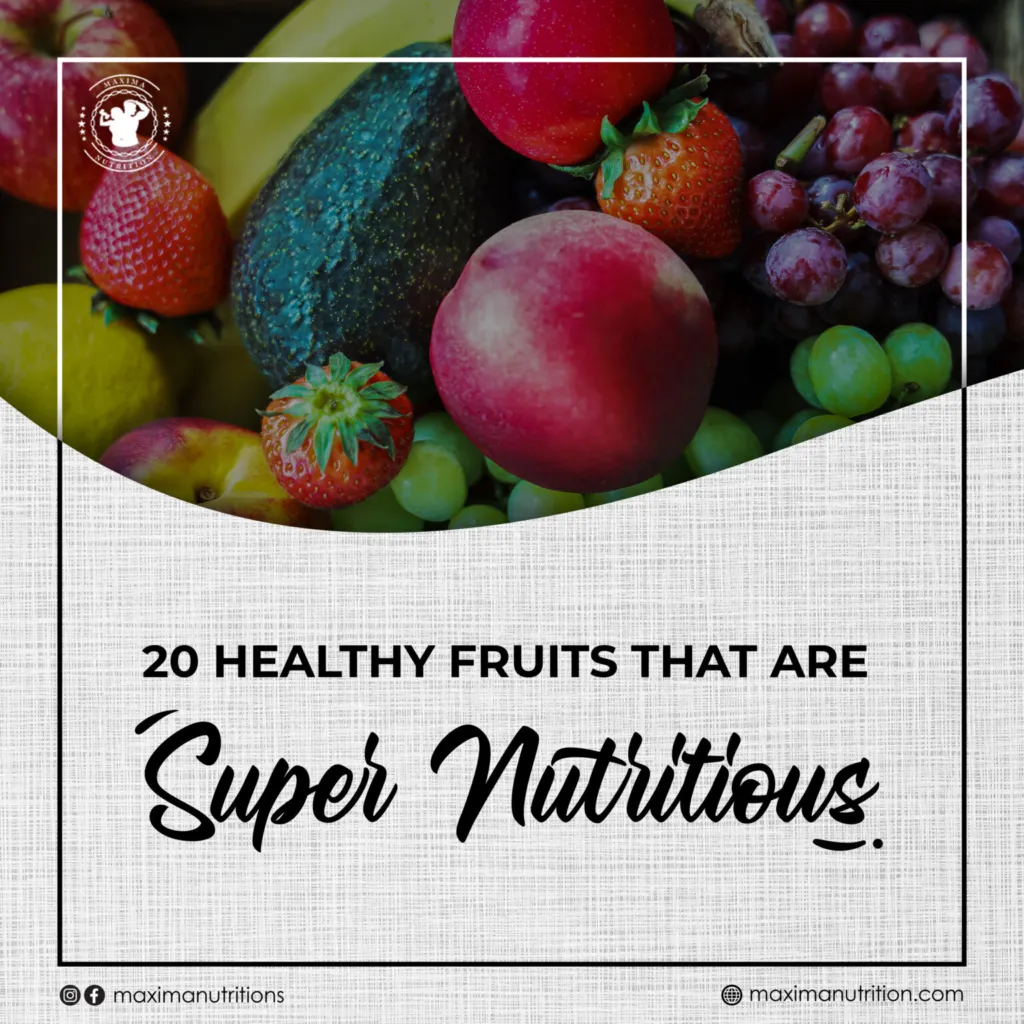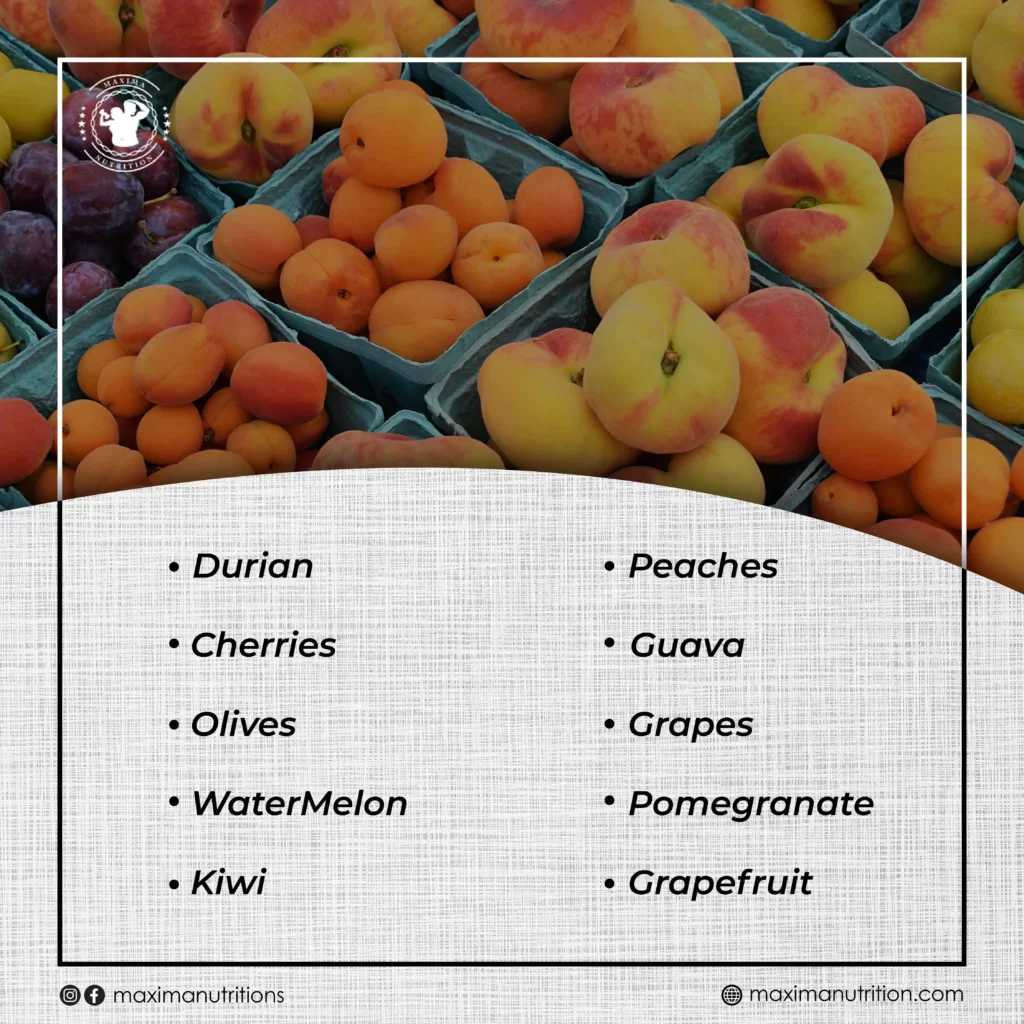
Fruit is a highly nutritious, delicious, and convenient addition to any diet. Eating fruits is an excellent way to improve overall health and reduce the risk of disease. Fruits are an excellent source of essential vitamins and minerals, and they are high in fiber. They also provide a wide range of health-boosting antioxidants.
Eating a diet high in fruits can reduce a person’s risk of developing heart disease, cancer, inflammation, and diabetes. Citrus fruits and berries may be especially powerful for preventing disease.
In this article, we look at the many health benefits of fruits and 20 healthiest and most nutritious fruits to enjoy regularly.
1. Apples
Apples are one of the most popular fruits and are full of nutrition. They’re rich in both soluble and insoluble fibre, such as pectin, hemicellulose, and cellulose. These fibres help regulate blood sugar levels, promote good digestion, and support gut and heart health.
Additionaly, they’re a good source of vitamin C and plant polyphenols, which are disease-fighting compounds found in plants. In fact, consuming apples regularly may lower your risk of heart disease, stroke, cancer, overweight, obesity, and neurological disorders.
Note: Most of the polyphenols in apples are located just below the skin, so be sure to eat them to reap the greatest benefits.
2. Blueberries
Blueberries are well known for their antioxidant and anti-inflammatory properties. They are high in Anthocyanin, a plant pigment and flavonoid that gives blueberries their characteristic blue-purple colour. This compound helps fight cell-damaging free radicals that can lead to disease.
Health benefits of a diet high in anthocyanins include lower risk of type 2 diabetes, heart disease, overweight, obesity, high blood pressure, certain types of cancer, and cognitive decline.
3. Bananas
Bananas are not only a great source of Potassium but other nutrients as well. Along with providing 7% of the Daily Value for potassium, bananas contain Vitamin B6, Vitamin C and Magesium. In addition, they offer a wide variety of polyphenols and phytosterols, both of which support your overall health. Bananas are high in prebiotics, a type of fibre that promotes the growth of beneficial bacteria in the gut.
Note that green, unripe bananas are higher in resistant starch than ripe ones, and they’re a good source of the dietary fibre pectin. Both of these have been linked to several health benefits, including improved blood sugar control and better digestive health.
Meanwhile, ripe bananas are an excellent source of easily digested carbs, making them great to fuel up on before a workout.
4. Oranges
Oranges are known for their high vitamin C content, providing 91% of the Daily Value in a single fruit. They’re also high in potassium, folate, Vitamin B1, fibre, and plant polyphenols. Consuming whole oranges may lower inflammation, blood pressure, cholesterol, and post-meal blood sugar.
Though 100% orange juice provides a high volume of nutrients and antioxidants, it usually lacks dietary fibre. Varieties that include the pulp do include some fibre, so opt for these over juices without pulp. That said, try to eat whole oranges more often.
5. Dragon Fruit
Also known as pitaya or pitahaya, dragon fruit is rich in many nutrients, including fibre, iron, magnesium, and vitamins C and E. It’s also an excellent source of carotenoids, such as lycopene and beta carotene.
People in Southeast Asian cultures have regarded dragon fruit highly for hundreds of years as a health-promoting fruit. Over recent decades, it has gained popularity in Western countries.
6. Mango
Mango is known as the “king of fruits”. Mangoes are an excellent source of potassium, folate, fibre, and vitamins A, C, B6, E, and K. They’re also rich in numerous plant polyphenols that have antioxidant and anti-inflammatory properties.
In addition, mangoes are high in mangiferin, a potent antioxidant. Studies have shown it may protect the body from chronic diseases, such as type 2 diabetes, heart disease, Alzheimer’s, Parkinson’s, and certain forms of cancer.
Mangoes also contain fibre, which helps support regular bowel movements and aids digestive health.
7. Avocado
Unlike most other fruits, avocados are high in healthy fats and low in natural sugars. They’re mostly made of oleic acid, a monounsaturated fat linked to better heart health. They also contain high amounts of potassium, fibre, vitamin B6, folate, vitamins E and K, and two carotenoids known as lutein and zeaxanthin, which support eye health.
Recent studies have found a significant decrease in cholesterol levels and an increase in blood lutein levels among those who consumed an avocado per day for 5 weeks.
Avocados are higher in calories than most other fruits. However, studies have linked them to better weight management. Researchers have proposed that this is because their high fat and fibre contents promote fullness.
8. Lychee
Lychee, which is also known as litchi and Chinese cherry, is packed with nutrition. It is a rich source of vitamin C, potassium, fibre, and many polyphenols with anti-inflammatory and antioxidant properties. These include Gallic acid, chlorogenic acid, catechins and caffeic acid.
One serving of lychee is around seven small individual fruits.
9. Pineapple
Pineapple is one of the most popular tropical fruits. One cup of pineapple provides 88% of the Daily Value for vitamin C and 73% for manganese. Manganese supports metabolism and blood sugar regulation and acts as an antioxidant.
Pineapple also contains several polyphenolic compounds that have antioxidant and anti-inflammatory properties.
Additionally, pineapple contains an enzyme known as bromelain, which people commonly use to tenderize meats. Anecdotal sources also claim this enzyme may support digestion, though there’s limited research on this.
10. Strawberries
Strawberries are a favourite fruit for many. They’re delicious, convenient, and highly nutritious. In particular, strawberries are a good source of vitamin C, folate, and manganese. They’re full of plant polyphenols that act as antioxidants, such as flavonoids, phenolic acids, lignans, and tannins.
In particular, they’re high in anthocyanins, ellagitannins, and proanthocyanidins, which have shown reduce the risk of chronic disease. Furthermore, they have a low glycemic index, meaning they won’t significantly affect your blood sugar levels.

11. Durian
Though known for its pungent smell, durian is incredibly nutritious. It is an excellent source of fibre, potassium, manganese, vitamin c, vitamin b6 and thiamine(b1). It also contains plenty of other B vitamins, copper, folate, and magnesium. It is also rich in plant polyphenols including flavonoids such as anthocyanins, phenolic acids such as cinnamic acid,tannins and other beneficial plant compounds such as carotenoids.
It’s also a high source of potassium and fibre, both of which contribute to good heart health. Finally, durian pulp has probiotic effects, which may support healthy gut diversity.
12. Cherries
Cherries are a great source of fibre and potassium, which are important for heart and gut health. They’re also high in antioxidant plant compounds, such as anthocyanins and hydroxycinnamates, which help protect the body from oxidative stress.
Furthermore, they’re a good source of serotonin, tryptophan, and melatonin, which support good mood and sleep.
13. Olives
Olives are a great addition to your diet. They’re an excellent source of vitamin E, copper, and monounsaturated fat called oleic acid. They’re also rich in plant polyphenols, such as oleuropein, hydroxytyrosol, and quercetin with anti-inflammatory and antioxidant properties.
In fact, whole olives and olive oil make up a large component of the Mediterranean diet, which studies have shown may lower the risk of heart disease, type 2 diabetes, cognitive decline, overweight, and obesity.
14. Watermelon
Watermelon is a highly nutritious summer favourite. It’s an abundant and excellent source of antioxidants, such as vitamins A and C, beta carotene, and lycopene. It’s also a good source of potassium and magnesium. Watermelon is one of the top sources of lycopene, a carotenoid that gives watermelon its pink-red colour. Lycopene is linked to lower levels of oxidative stress and inflammation. It may also decrease the risk of heart disease, cancer, and type 2 diabetes.
Interestingly, lycopene and beta carotene may also provide minor skin protection from ultraviolet (UV) rays, reduce the risk of sunburns, and help your skin heal faster.
Finally, watermelon has uniquely high water content. Since it’s high in both water and potassium, it can help hydrate and replenish electrolytes after a workout or on a hot summer day.
15. Kiwi
Kiwi is also known as the Chinese gooseberry. Itis great for your health. Kiwi is high in vitamin C and a good source of fibre, potassium, folate, and vitamin E. It’s also a good carotenoid source, including lutein, zeaxanthin, and beta carotene, which support eye health and become more dominant as fruits ripen.
Kiwi has been used in traditional Chinese medicine for hundreds of years to support gut health and digestion. These benefits are due to its soluble and insoluble fibre, polyphenols, and digestive enzymes such as actinidin.
One small study showed that consuming 2 kiwis daily for 3 days increased stool frequency and softened stool, suggesting it may help treat mild constipation.
16. Peaches
Peaches are another summer favourite. They’re a good source of potassium, fibre, and vitamins A, C, and E. They also contain the carotenoids lutein, zeaxanthin, and beta carotene.
While the flesh and skin are both nutritious, the skin contains higher antioxidants, which can help fight free radicals in your body. Therefore, make sure you eat the peach skin to reap the greatest health benefits.
17. Guava
Guava is a fantastic source of vitamin C. In fact, a single fruit provides 140% of the Daily Value for this nutrient. Along with this, guava contains some of the highest amounts of lycopene compared with other lycopene-rich foods like tomatoes, watermelon, and grapefruit.
It’s also a high source of other antioxidants, such as beta carotene and various flavonoids.
Because guava is so high in nutrients and antioxidants, consuming it regularly may support the health of your eyes, heart, kidneys, and skin. It may also protect against chronic diseases and support a healthy immune system.
18. Grapes
Grapes are healthy, and particularly high in potassium and vitamin K, supporting heart health. They’re a rich source of beneficial plant compounds that have been linked to numerous health benefits, such as a lowered risk of heart disease and certain types of cancer.
While all varieties of grapes provide benefits, red and purple grapes have the highest antioxidant content. In particular, they produce purple-red pigments called anthocyanins, linked to better heart and brain health.
19. Pomegranates
Pomegranates contain a large variety of beneficial plant compounds, such as flavonoids, tannins, and lignans. These have strong antioxidant and anti-inflammatory properties that help fight free radicals and reduce your risk of chronic disease.
20. Grapefruit
Grapefruit is one of the healthiest citrus fruits. It’s packed with vitamin C, potassium, fibre, and beta carotene, which your body converts into vitamin A.
Study has shown that grapefruit consumption was linked to higher HDL levels (good) cholesterol and lower body weight, waist circumference, body mass index (BMI), triglycerides, and levels of inflammation. Moreover, regularly consuming grapefruit may aid weight management and promote heart health.
Though grapefruit is highly nutritious, some of its compounds can lessen or alter the effectiveness of certain medications. Talk with your healthcare professional about whether you can eat grapefruit if you’re taking corticosteroids, anti-anxiety medications, immunosuppressants or calcium channel blockers.
Many delicious and nutritious fruits can help ensure good health. While this list provides 20 of the most nutritious fruits, there are many others you can choose from. To reap the greatest benefits, be sure to eat a variety of colourful fruits daily.

